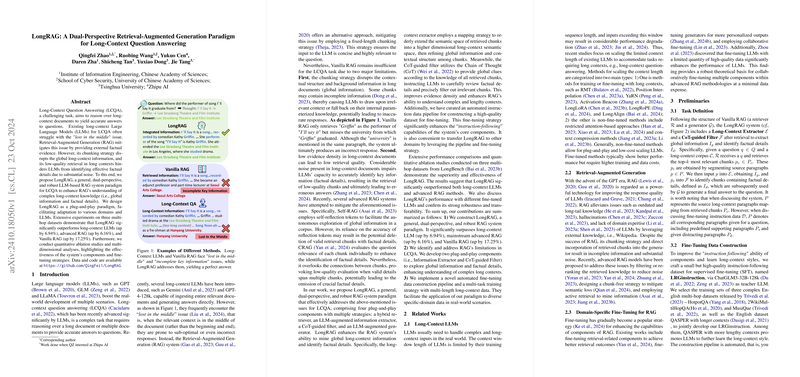LongRAG: A Comprehensive Approach to Long-Context Question Answering
The paper "LongRAG: A Dual-Perspective Retrieval-Augmented Generation Paradigm for Long-Context Question Answering" tackles the significant challenge of Long-Context Question Answering (LCQA). LCQA requires effectively processing extensive documents to provide precise answers to queries. Existing approaches using LLMs face limitations, including the "lost in the middle" issue, where models struggle to retrieve relevant information that is not positioned at the start or end of documents.
Contribution
The primary contribution of this paper is the introduction of LongRAG, a robust paradigm designed to improve retrieval-augmented generation (RAG) systems in understanding and processing long-context data. The work stands out by addressing two primary limitations of traditional RAG systems:
- Inadequate Chunking Strategy: Conventional chunking methods can disrupt global contextual understanding, causing models to miss critical connections between facts spread across the text.
- Noise Management: High noise levels within long documents make it difficult for LLMs to extract meaningful information accurately.
System Overview
LongRAG presents a novel architecture composed of four key components, ensuring the effective processing of long-context documents:
- Hybrid Retriever: Utilizes a dual-encoder and cross-encoder setup for efficient and accurate retrieval.
- LLM-augmented Information Extractor: This component regenerates global context information from retrieved chunks, thus preserving semantic coherence and facilitating comprehensive information extraction.
- CoT-guided Filter: Employs Chain of Thought (CoT) reasoning to dynamically assess chunk relevance and filter out non-essential content, enhancing the density of evidence used in answer generation.
- LLM-augmented Generator: Integrates insights from global context and factual detail to produce accurate answers.
Experimental Validation
The paper validates LongRAG through rigorous experimentation on three multi-hop datasets from LongBench, demonstrating its superior performance. Key findings include:
- Performance Gains: LongRAG achieves significant improvements over baseline models, with increases of up to 6.94% compared to long-context LLMs, 6.16% over advanced RAG systems, and 17.25% relative to Vanilla RAG.
- Robustness and Flexibility: Ablation studies confirm the efficacy of individual components and underscore the system's robustness across various long-context scenarios.
- Efficiency: LongRAG maintains high performance while reducing token input to the generator, highlighting an efficient processing approach with minimal redundancy.
Implications and Future Prospects
Practically, LongRAG's design as a plug-and-play system allows for broad adaptability across different domains and compatibility with various LLMs, increasing its applicability in diverse real-world scenarios. Theoretically, the dual-perspective retrieval strategy marks a significant step forward in RAG methodologies, suggesting potential new avenues for research into complex information retrieval and generation tasks.
Future research could focus on exploring adaptive multi-round retrieval strategies to further enhance component interactions within dynamic information landscapes. Moreover, a focus on cross-domain transferability and performance measurement could solidify LongRAG's utility in other AI and NLP applications.
Conclusion
Overall, LongRAG emerges as a robust framework advancing the state-of-the-art in LCQA by integrating retrieval and generation components through a novel dual-perspective approach. This work contributes significantly to ongoing efforts aimed at refining LLM capabilities in handling extensive, complex informational contexts.
